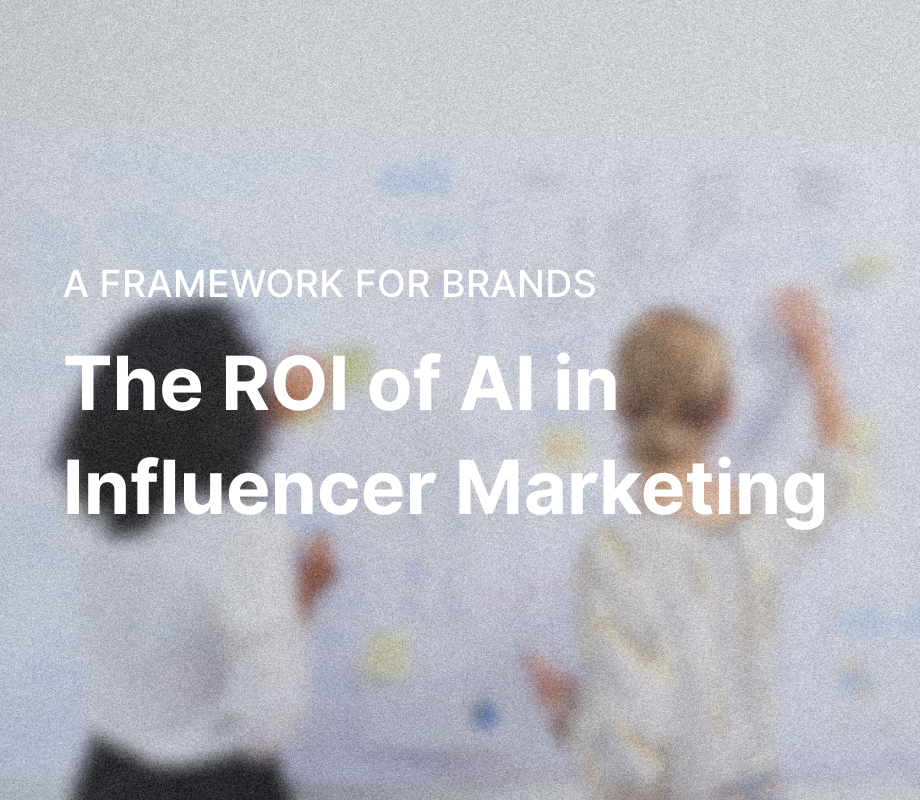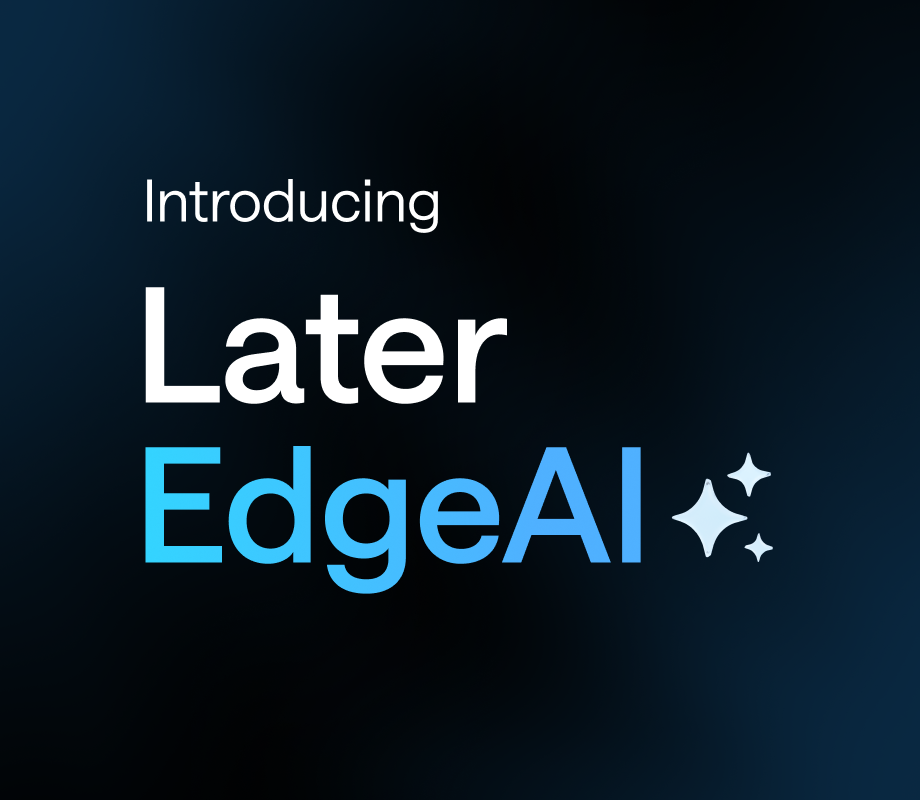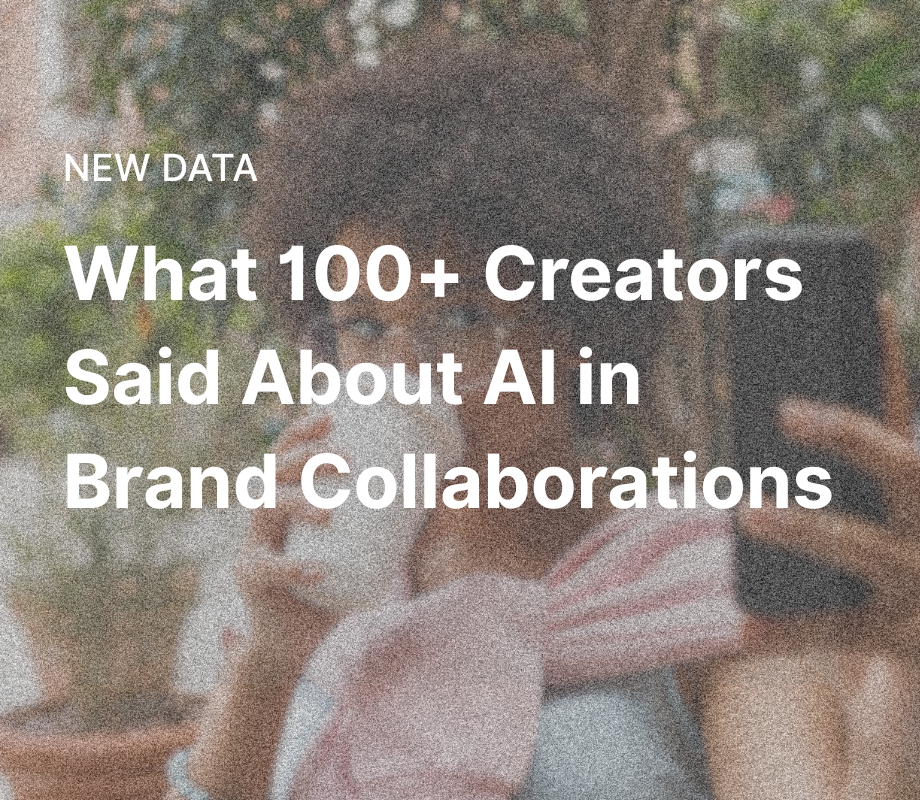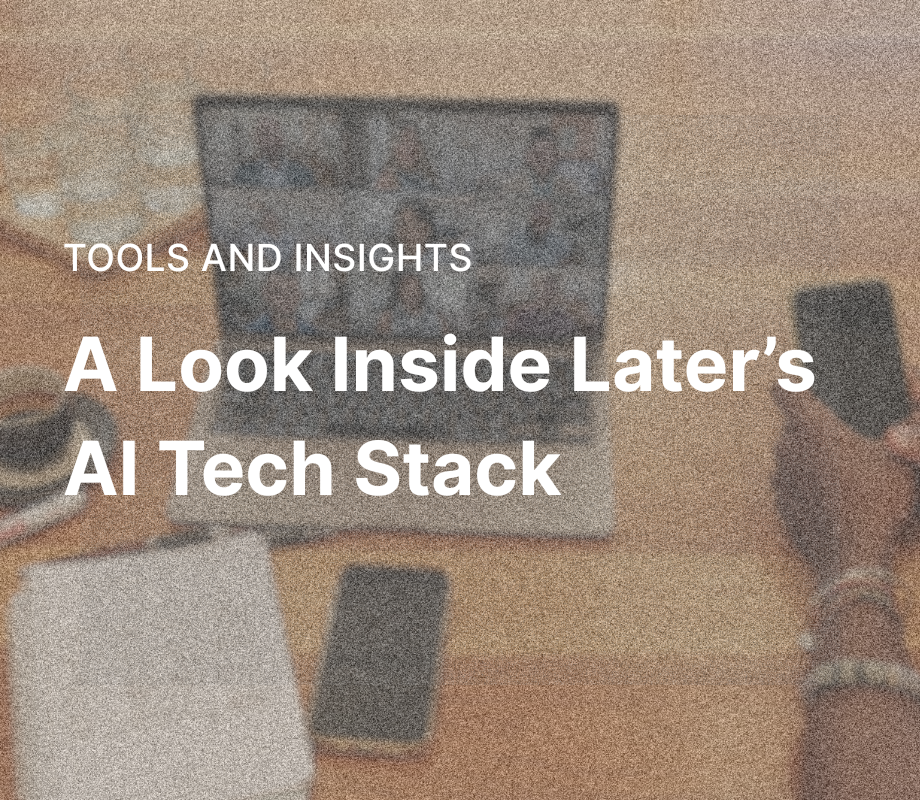TL;DR
77% of brands report better campaign performance with AI-assisted influencer marketing, with 37% seeing "much better" results across engagement, targeting, and ROI.
AI is now mainstream in influencer marketing: 62% of brands use it extensively, and 90% are confident it will deliver long-term value.
The ROI comes from four key areas: higher engagement rates (37%), more efficient targeting (37%), faster content turnaround (33%), and better cost efficiency (30%).
Brands seeing the best results embrace AI-savvy creators, establish clear disclosure expectations early, and focus on partnerships that balance efficiency with authentic storytelling.
Table of Contents
Marketing leaders are facing an impossible equation: deliver more impact with tighter budgets, faster timelines, and higher expectations for measurable ROI. Every campaign dollar needs to work harder, partnerships need to prove their value, and strategy decisions get scrutinized through the lens of business outcomes.
Enter artificial intelligence, which has quietly moved from experimental to essential in influencer marketing. According to new research from Later,* 75% of brands are open to using AI in creator collaborations in 2025, up from just 29% two years prior in 2023. This shift in sentiment suggests that AI adoption is moving from competitive advantage to competitive necessity.
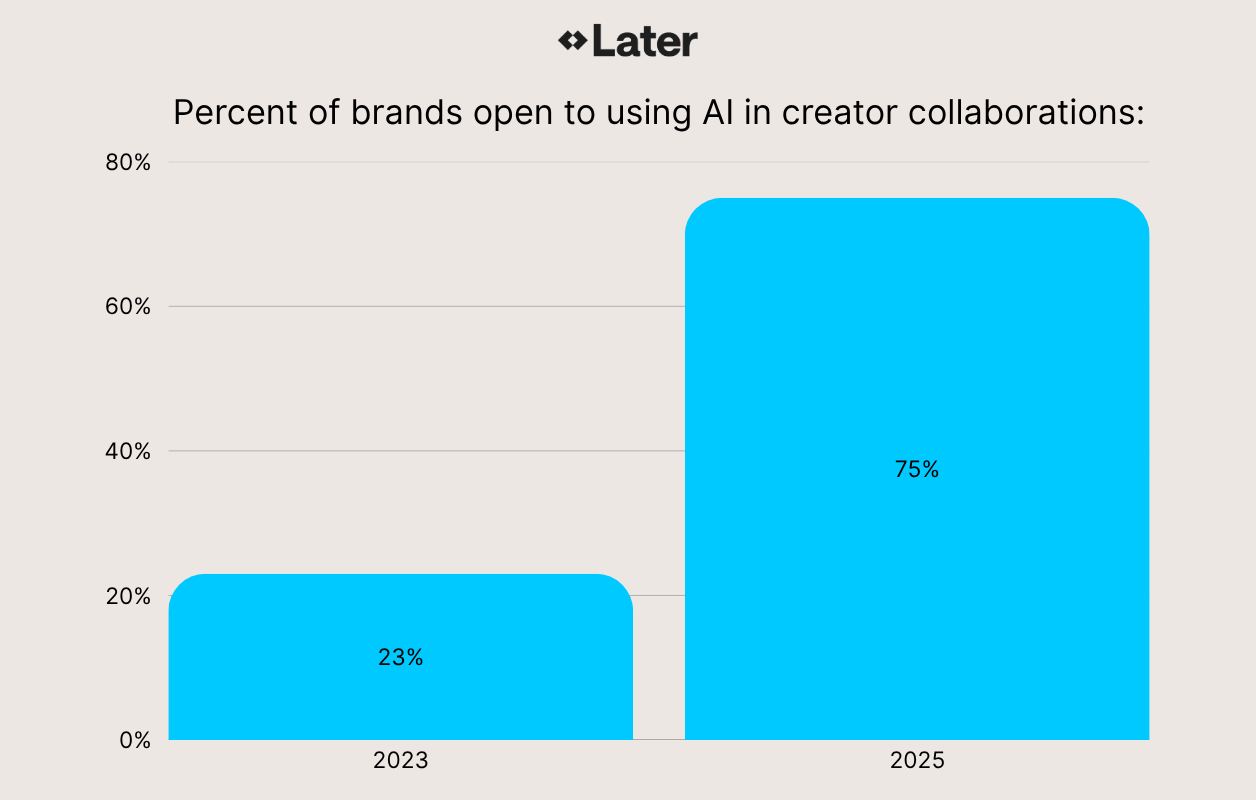
The numbers tell a story brands can't ignore
Additionally, 77% of brands report better campaign performance when using AI-assisted influencer campaigns, with 37% saying results are "much better" than traditional approaches. For these brands, AI adoption represents a strategic response to competitive pressure and the need for measurable results, grounded in real performance data rather than industry hype.
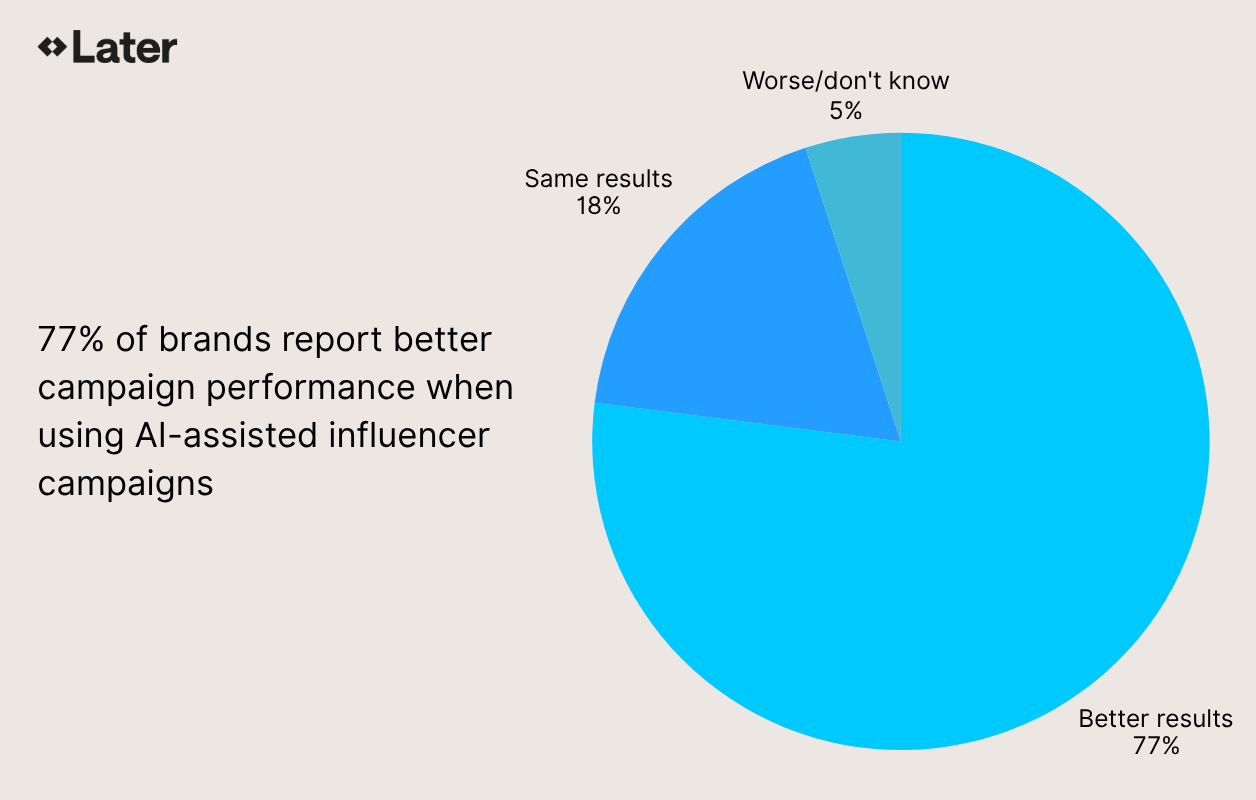
We recently surveyed influencer marketing decision-makers, and the data revealed something significant happening in how brands approach influencer partnerships. Among CPG companies with more than $5 million in annual revenue who are actively using AI in their influencer marketing programs, the confidence level is striking: 90% express confidence that AI will deliver long-term value, with 59% saying they're "very confident."
This confidence stems from real-world experience rather than theoretical potential. These marketing leaders have moved past pilots and test campaigns into scaled implementation, giving them concrete data on what AI can actually deliver for their influencer programs. In fact, 62.2% of brands surveyed report using AI extensively in their influencer marketing over the past 12 months, not just in experimental projects. The technology has crossed the threshold from "interesting" to "integrated."
What's particularly telling is how brands now perceive AI's role in their marketing mix. When asked about their current view of AI in influencer marketing, 46% describe it as a "strategic growth driver," while another 42% call it "useful for efficiency, not just results." Only 10% still view it as risky or unproven. The conversation has fundamentally shifted from whether to adopt AI to how to maximize its impact.
Four ways AI drives measurable ROI in influencer marketing
The performance improvements brands are seeing aren't coming from a single source. Instead, AI is creating value across multiple dimensions of campaign execution, with different brands seeing wins in different areas depending on their specific challenges and goals.
Higher engagement rates: For 37% of brands, improved engagement represents the most significant outcome from AI-assisted campaigns. These marketers report that AI-powered tools help identify creators whose audiences are genuinely interested in their products, leading to more authentic interactions and better performance metrics.
More efficient targeting and reach: Another 37% cite more efficient targeting and reach as their top improvement area. AI excels at analyzing massive datasets to identify patterns humans might miss. Brands report using AI to compile multiple reports on campaign success, analyze results faster, and pick up on market trends more quickly. As one marketer explained, "We're able to reach our target market more effectively, which in turn allows us to make more sales."
Faster content turnaround: Speed matters in social media marketing, where cultural moments and trending topics have short windows of relevance. For 33% of brands, faster turnaround time represents AI's greatest contribution. Multiple respondents mentioned that AI "can help cut time in half when creating content" and reduces the time staff spend on routine tasks. Beyond the cost savings, this efficiency enables brands to respond more quickly to cultural moments and experiment with multiple creative approaches within the same campaign timeline.
Better cost efficiency: 1 in 3 brands point to improved cost efficiency and ROI as their primary AI benefit. In an environment where marketing budgets face constant pressure, AI helps stretch dollars further while maintaining or improving results. The technology enables brands to make smarter decisions about creator selection, content approaches, and campaign optimization without necessarily increasing spend.
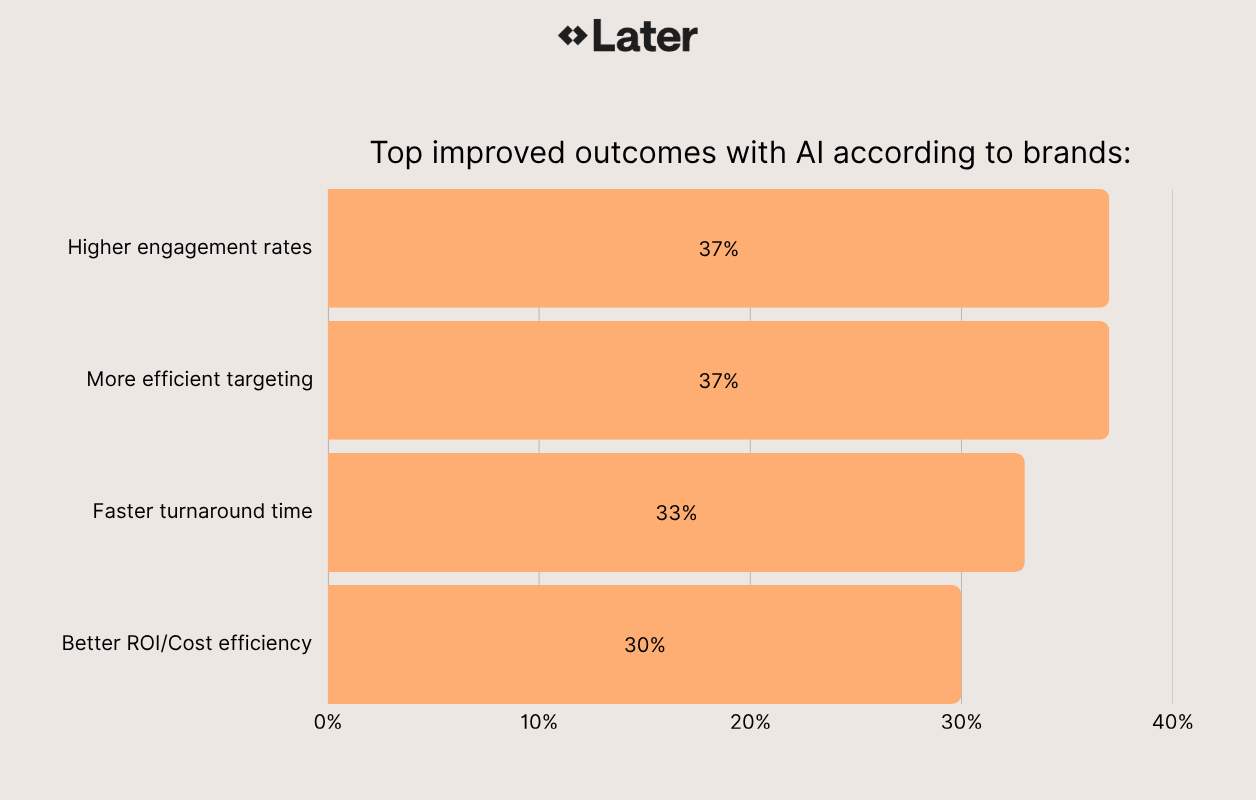
How AI translates to business results
The qualitative feedback from marketing leaders reveals how these improvements translate into real business outcomes. When asked how AI has led to success in their influencer marketing efforts, several themes emerge consistently:
Sales growth and business expansion
Multiple brands directly link their AI usage to measurable revenue impact. Survey responses include concrete statements like "better data analysis that helps us pick trends in the market much more quickly" and "we are able to analyze results much faster and compile multiple reports on the success of influencer marketing campaigns and content." These aren't vague efficiency claims. These are marketers connecting AI adoption to their ability to drive sales and grow their business.
Data-driven decision making
AI's ability to surface insights from campaign data represents a fundamental shift in how brands approach influencer partnerships. Rather than relying primarily on intuition or historical relationships, marketers now have access to predictive insights about which creators, content types, and messaging approaches are likely to perform best. One respondent highlighted AI's value in "better audience growth because it gave me better strategies to use," while another noted that AI helps reach target markets more effectively.
Strategic advantages beyond efficiency
While time savings matter, the more sophisticated AI users are finding strategic advantages that go beyond just doing things faster. Brands report that AI "came up with ways that as a group we ourselves didn't think of," suggesting that the technology is genuinely expanding creative possibilities rather than simply automating existing processes. The ability to test more variations, analyze performance in real-time, and optimize campaigns mid-flight creates a competitive advantage that compounds over time.
How brands can capture AI's performance advantages
Understanding that AI delivers results is one thing. Actually integrating it into your influencer marketing workflows in a way that captures value is another. Here’s how you can start transforming your processes today:
1. Start with your biggest pain points
The brands seeing the most dramatic improvements tend to be those that deployed AI to solve specific, well-defined challenges rather than trying to transform everything at once. If your team struggles with creator discovery and vetting, start there. If campaign reporting and analysis consume too much time, focus AI adoption on that bottleneck. The technology works best when it addresses a genuine operational need.
2. Think beyond automation
While AI excels at automating repetitive tasks, the real performance gains come from its ability to surface insights and enable better decision-making. Look for opportunities where AI can help you make smarter choices about strategy, not just execute faster. This might mean using AI to identify emerging content trends, predict which creator partnerships will perform best, or optimize messaging based on real-time engagement data.
3. Build AI literacy across your team
The most successful implementations involve upskilling marketing teams so they understand both AI's capabilities and its limitations. This doesn't mean everyone needs to become a data scientist, but teams do need enough fluency to ask good questions, interpret AI-generated insights, and make strategic decisions informed by AI recommendations rather than simply following them blindly.
4. Choose platforms that make AI accessible
The gap between AI's potential and its actual impact often comes down to implementation complexity. Brands seeing the best results tend to work with platforms that have AI capabilities built in rather than trying to cobble together multiple point solutions. Later EdgeAI, our AI-native predictive intelligence engine trained on data from 16 million creators and over $2 billion in verified influencer-driven purchases, helps brands run AI-first campaigns with predictable, forecasted outcomes—achieving 41% higher engagement rates and partnerships with 72% more creators. This reduces the technical burden on marketing teams while ensuring AI insights are available when and where decisions get made.
5. Measure what matters
As AI becomes more central to your influencer marketing program, establish clear metrics that connect AI usage to business outcomes. Track not just efficiency gains but actual performance improvements in engagement, conversion, and revenue. The brands expressing the highest confidence in AI's long-term value are those that have data showing a tangible impact on their KPIs.
Why your competitors aren’t waiting
Perhaps the most important finding in the research isn't about what AI can do, but about the speed at which it's becoming a fundamental necessity.
Marketing leaders who wait for AI to prove itself further may find themselves at a disadvantage against competitors who have already built AI-powered workflows and are iterating toward even better results.
The data makes the case clearly: AI in influencer marketing is a revenue driver, a strategic enabler, and increasingly, a requirement for brands that want to maximize ROI in the creator economy.
Discover how Later can help your team scale AI-assisted influencer campaigns that deliver real ROI. Schedule a conversation with our team to learn how leading brands are turning creator partnerships into revenue drivers.
*Methodology: Later survey of 189 influencer marketing decision-makers for CPG brands with >$5M ARR who have used AI in influencer marketing in the past 12 months conducted in September 2025.
